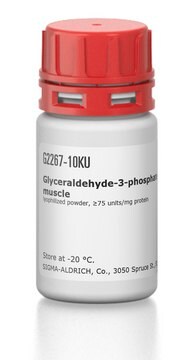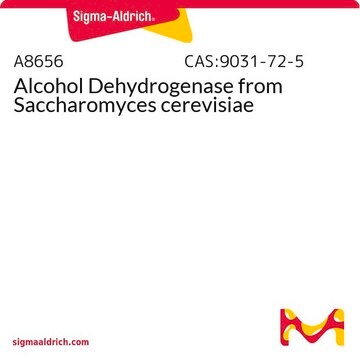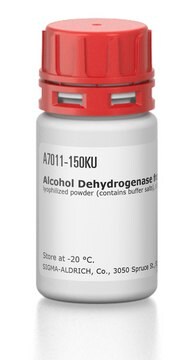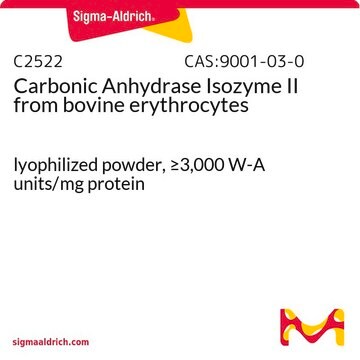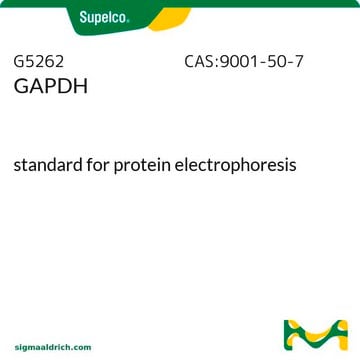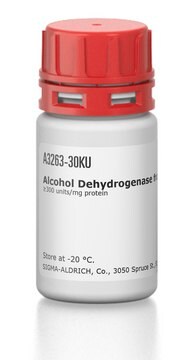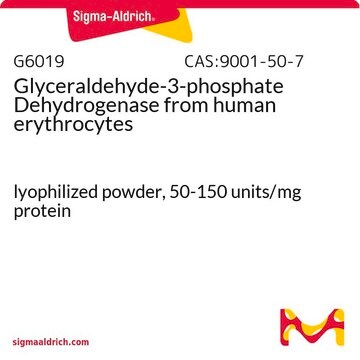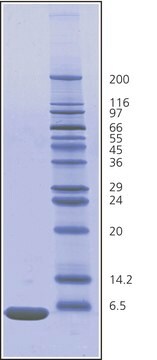E6126
Enolase from baker′s yeast (S. cerevisiae)
lyophilized powder, ≥50 units/mg protein
Synonym(s):
2-Phospho-D-glycerate hydro-lyase, Phosphopyruvate hydratase
Sign Into View Organizational & Contract Pricing
All Photos(2)
About This Item
Recommended Products
form
lyophilized powder
Quality Level
specific activity
≥50 units/mg protein
mol wt
93 kDa
composition
Protein, 50-80% modified Warburg-Christian
solubility
15 mM Tris HCl, pH 7.4: soluble 1.0 mg/mL, clear
storage temp.
−20°C
General description
Enolase (2-phosphoglycerate hydratase) is a cytosolic enzyme. This cytosolic metalloenzyme is encoded by three homologous genes in mammals. Enolase the from baker′s yeast is a homodimer containing two bound Mg2+ ions. The peptide consists of 436 amino acids and contains a single cysteine residue and corresponds to a molecular weight of 93 kDa. Two of the active site components include His191 and Arg414. Enolase is seen in archaea, bacteria and eukaryotes.
Application
Enolase from baker′s yeast (S. cerevisiae) has been used as a supplement in assay buffer for phosphoglycerate mutase (PGM) enzyme assays.
Enolase from baker′s yeast has been used in a study to investigate the contribution of the antibodies response induced by a low virulent Candida albicans strain in protection against systemic candidiasis. Enolase from baker′s yeast has also been used in a study to investigate the role of metal ions in catalysis by enolase.
The enzyme from Sigma has been used as an antigen during ELISA. the study used human granulocyte proteins to identify and characterize autoantibodies against catalase and α-enolase in patients with primary sclerosing cholangitis. It has been used to study temperature- and denaturant-induced yeast enolase denaturation using fourier transform infrared spectroscopy. It has also been used along with other proteins to study gradient chromatofocusing-mass spectrometry; a new technique for protein analysis.
Biochem/physiol Actions
Enolase plays a key role in glycolysis and gluconeogenesis. Enolase, found in the nucleus of mammalian cells plays a key role in transcriptional modulation of genes, which participates in morphological transformation and cell proliferation.
The phosphorylated tyrosine residue present in yeast enolase forms a substrate for phosphorylation by tyrosine protein kinase. Apart from Mg2+, the enzyme can be activated by Zn2+, Mn2+, and Cd2+.
Enolase is a metalloenzyme that catalyzes the interconversion of 2-phosphoglycerate to phosphoenolpyruvate. Enolase is essential for both glycolysis and gluconeogenesis.
Unit Definition
One unit will convert 1.0 μmole of 2-phosphoglycerate to phospho(enol)pyruvate per min at pH 7.4 at 25 °C.
Physical form
Lyophilized powder containing Tris buffer salts
Storage Class Code
11 - Combustible Solids
WGK
WGK 3
Flash Point(F)
Not applicable
Flash Point(C)
Not applicable
Personal Protective Equipment
dust mask type N95 (US), Eyeshields, Gloves
Choose from one of the most recent versions:
Certificates of Analysis (COA)
Lot/Batch Number
Don't see the Right Version?
If you require a particular version, you can look up a specific certificate by the Lot or Batch number.
Already Own This Product?
Find documentation for the products that you have recently purchased in the Document Library.
Customers Also Viewed
J A Cooper et al.
The Journal of biological chemistry, 259(12), 7835-7841 (1984-06-25)
Enolase, lactate dehydrogenase, and phosphoglycerate mutase have previously been found to contain phosphotyrosine in fibroblasts transformed by Rous sarcoma virus, which encodes a tyrosine-specific protein kinase. However, these phosphorylations are not stoichiometric, and their significance for any aspect of the
Immunity to Haemonchus contortus and vaccine development
Advances in Parasitology, 93, 353-396 (2016)
The Wolbachia endosymbiont of Brugia malayi has an active phosphoglycerate mutase: a candidate target for anti-filarial therapies
Foster JM, et al.
Parasitology Research, 104(5), 1047-1047 (2009)
T Orth et al.
Clinical and experimental immunology, 112(3), 507-515 (1998-07-02)
Primary sclerosing cholangitis (PSC) is a chronic cholestatic liver disease of unknown aetiology. Recent studies have shown that genetic factors and both cellular and humoral immunological abnormalities are important in the pathogenesis of PSC. The most prominent autoantibodies in PSC
Measurement of enolase activity in cell lysates
Test, 542, 115-124 (2014)
Our team of scientists has experience in all areas of research including Life Science, Material Science, Chemical Synthesis, Chromatography, Analytical and many others.
Contact Technical Service
